1. Introduction
1.1. Overview of Chia Seeds
Chia seeds, tiny yet mighty, have taken the health world by storm. These little seeds come from the plant Salvia hispanica, a member of the mint family. They might be small, but they pack a powerful nutritional punch.
1.2. Historical Significance
Historically, chia seeds were a staple in the diets of ancient civilizations like the Aztecs and Mayans. The word “chia” even means “strength” in the Mayan language, underscoring their value.
1.3. Modern Popularity
In today’s health-conscious world, chia seeds have surged in popularity. Their versatility and impressive health benefits make them a go-to superfood for many.
2. Nutritional Profile
2.1. Macronutrients
Chia seeds are an excellent source of macronutrients. They contain high levels of protein, healthy fats, and carbohydrates, providing a balanced nutritional profile.
2.2. Micronutrients
Beyond macronutrients, chia seeds are rich in essential micronutrients like calcium, magnesium, and phosphorus. These nutrients are crucial for maintaining overall health.
2.3. Unique Compounds
Chia seeds also boast unique compounds such as antioxidants and omega-3 fatty acids, which offer a range of health benefits.
1. Rich in Antioxidants
3.1. Types of Antioxidants in Chia Seeds
They are loaded with antioxidants, including chlorogenic acid, caffeic acid, and flavonoids. These antioxidants help protect the body from free radicals.
3.2. Benefits of Antioxidants
Antioxidants are vital for reducing oxidative stress and inflammation. They play a key role in preventing chronic diseases and maintaining overall health.
2. High in Fiber
4.1. Types of Fiber in Chia Seeds
They are high in both soluble and insoluble fiber. Soluble fiber helps absorb water, forming a gel-like substance, while insoluble fiber adds bulk to stool.
4.2. Digestive Health Benefits
The high fiber content in chia seeds promotes regular bowel movements and prevents constipation. It also supports a healthy digestive system.
4.3. Weight Management
Fiber-rich foods like chia seeds help you feel full longer, reducing overall calorie intake. This can be particularly beneficial for weight management and control.
3. Omega-3 Fatty Acids
5.1. Types of Omega-3s in Chia Seeds
They are a plant-based source of alpha-linolenic acid (ALA), a type of omega-3 fatty acid. ALA is essential for various bodily functions.
5.2. Benefits for Heart Health
Omega-3 fatty acids are well-known for their heart health benefits. They help reduce bad cholesterol levels and lower the risk of heart disease.
5.3. Anti-inflammatory Properties
Omega-3s in chia seeds also have anti-inflammatory properties, which can help reduce chronic inflammation and related diseases.
4. Supports Bone Health
6.1. Calcium Content
Chia seeds are an excellent source of calcium, essential for maintaining strong bones and teeth. They provide more calcium per gram than many dairy products.
6.2. Other Bone-supporting Nutrients
In addition to calcium, chia seeds contain magnesium and phosphorus, which are also crucial for bone health and density.
5. Regulates Blood Sugar Levels
7.1. Mechanism of Blood Sugar Regulation
The fiber and healthy fats in chia seeds help slow down the absorption of sugar into the bloodstream, preventing blood sugar spikes.
7.2. Benefits for Diabetics
For people with diabetes, incorporating chia seeds into their diet can help manage blood sugar levels and improve overall glycemic control.
6. Boosts Energy and Metabolism
8.1. Nutrients that Boost Energy
Chia seeds provide a steady release of energy due to their combination of protein, fats, and carbohydrates. This makes them an excellent food for sustained energy.
8.2. Metabolic Benefits
The high nutrient density of chia seeds helps boost metabolism, aiding in better energy expenditure and fat burning.
7. Enhances Skin Health
9.1. Nutrients for Skin Health
Chia seeds are rich in antioxidants and omega-3 fatty acids, which are essential for maintaining healthy skin. These nutrients help reduce inflammation and promote skin repair.
9.2. Mechanisms of Action
The antioxidants in chia seeds protect the skin from free radical damage, while omega-3s help maintain skin hydration and elasticity.
8. Supports Digestive Health
10.1. Gut Health Benefits
The fiber in chia seeds acts as a prebiotic, feeding the beneficial bacteria in the gut. This helps maintain a healthy gut microbiome.
10.2. Prebiotic Properties
Chia seeds promote the growth of good bacteria in the gut, which is essential for digestion and overall health.
9. Improves Heart Health
11.1. Cholesterol Management
It helps reduce bad cholesterol levels and increase good cholesterol, improving overall heart health.
11.2. Blood Pressure Regulation
The nutrients in chia seeds, such as omega-3s and fiber, help regulate blood pressure, reducing the risk of hypertension.
10. Aids in Weight Loss
12.1. Mechanisms of Weight Loss Support
Chia seeds help in weight loss by providing a feeling of fullness, reducing overall calorie intake, and promoting healthy digestion.
12.2. Satiety and Hunger Control
The high fiber content in chia seeds helps control hunger and prevent overeating, making them a valuable addition to a weight loss diet.
13. How to Incorporate Chia Seeds into Your Diet

13.1. Simple Recipes
Chia seeds can be easily added to various recipes, such as smoothies, oatmeal, and yogurt, for a nutritional boost.
13.2. Creative Uses
Get creative with chia seeds by incorporating them into baked goods, salads, and even as an egg substitute in vegan recipes.
14. Potential Side Effects and Considerations
14.1. Digestive Issues
While chia seeds are beneficial, consuming them in large amounts may cause digestive issues such as bloating and gas.
14.2. Allergies
Some individuals may be allergic to chia seeds. It’s important to monitor for any adverse reactions when incorporating them into your diet.
14.3. Proper Dosage
Moderation is key. A typical serving size is about one to two tablespoons per day to reap the health benefits without overconsumption.
15. Buying and Storing chia seeds
15.1. How to Choose Quality Chia Seeds
When purchasing chia seeds, look for high-quality, organic options to ensure you’re getting the best nutritional value.
15.2. Storage Tips
Store chia seeds in a cool, dry place in an airtight container to keep them fresh and extend their shelf life.
16. Chia Seeds vs. Other Superfoods
16.1. Nutritional Comparison
Chia seeds hold their own when compared to other superfoods like flaxseeds and hemp seeds, offering a unique blend of nutrients.
16.2. Unique Benefits of Chia Seeds
While many superfoods have overlapping benefits, chia seeds stand out due to their high fiber content and versatility.
17. Chia Seeds in Traditional Medicine
17.1. Historical Uses
Chia seeds have been used traditionally for their medicinal properties, providing energy and strength in ancient cultures.
17.2. Modern Interpretations
Today, chia seeds are recognized for their health benefits, and their traditional uses are supported by modern research.
18. Environmental Impact of Chia Seed Cultivation
18.1. Sustainability
Chia seed cultivation is generally sustainable, requiring less water and pesticides compared to other crops.
18.2. Ethical Considerations
It’s important to consider the ethical implications of chia seed farming, ensuring that fair trade practices are followed.
19. Future Research and Potential
19.1. Emerging Studies
Ongoing research continues to uncover new health benefits of chia seeds, with promising results in various areas of health.
19.2. Potential Health Benefits
The potential health benefits of chia seeds are vast, with studies suggesting they may help in the prevention and management of several chronic diseases.
20. Conclusion
20.1. Summary of Benefits
Chia seeds offer an impressive array of health benefits, from supporting heart health to aiding in weight loss. Their rich nutritional profile makes them a valuable addition to any diet.
20.2. Final Thoughts on Incorporating Chia Seeds into Your Lifestyle
Incorporating chia seeds into your daily routine is simple and rewarding. Whether you sprinkle them on your morning yogurt or blend them into a smoothie, these tiny seeds can make a big difference in your overall health and well-being.













